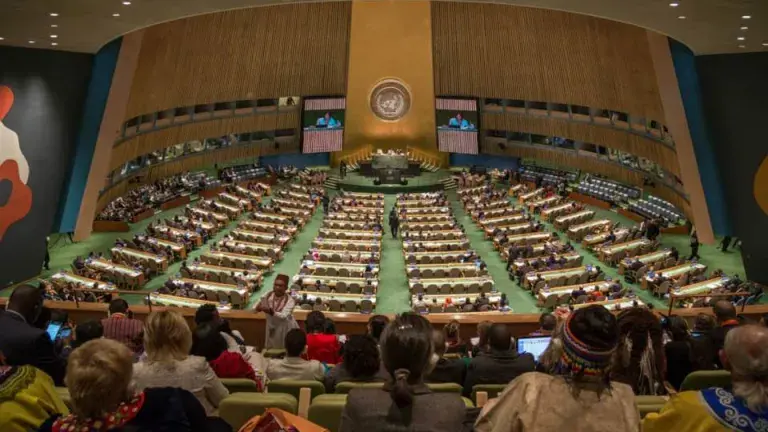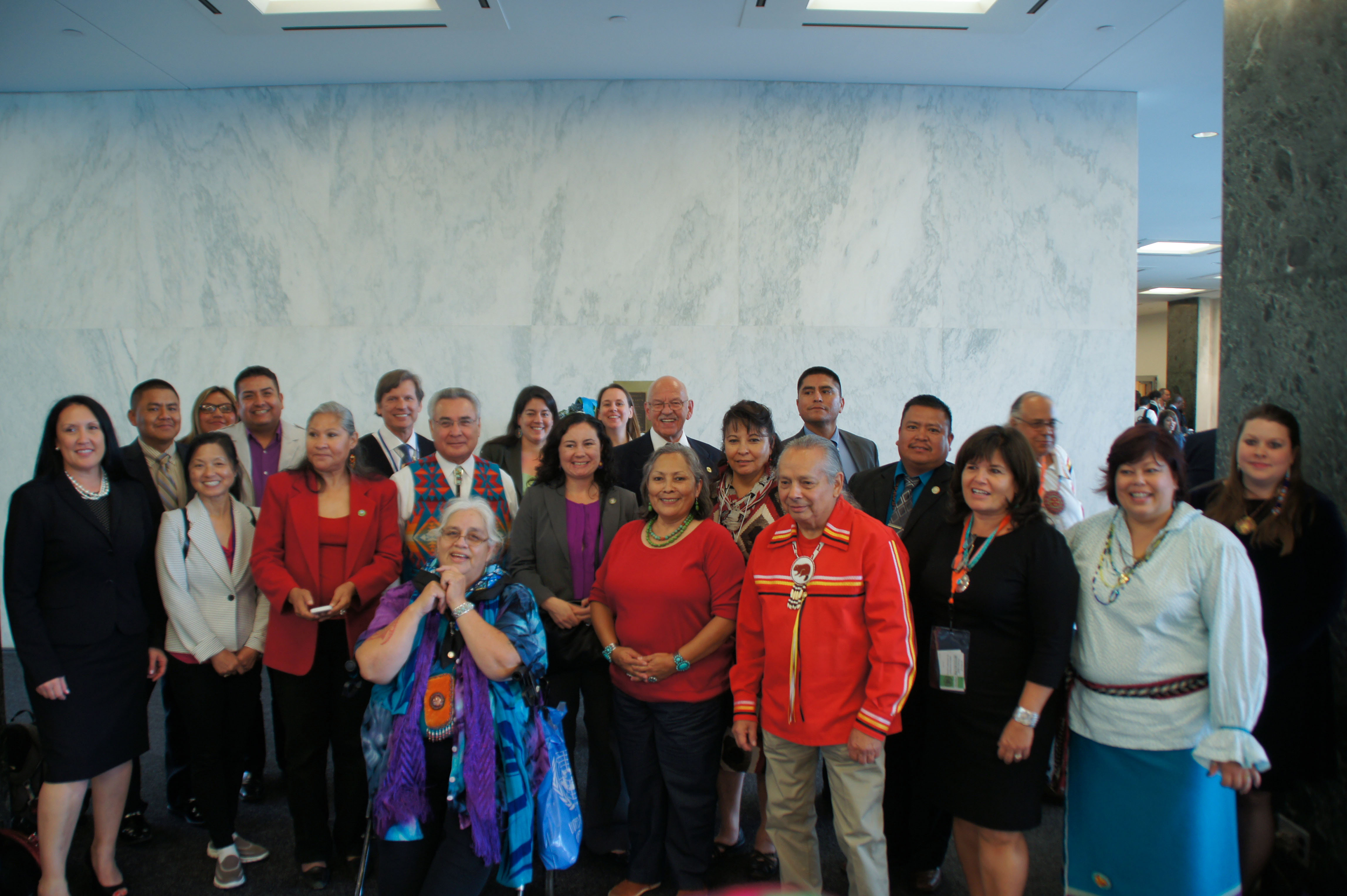
 Actions to Implement the World Conference on Indigenous Peoples Outcome Document
Actions to Implement the World Conference on Indigenous Peoples Outcome Document
List of Supporting 94 Indigenous Governments and 22 Organizations
Current as of July 5, 2016
The UN World Conference on Indigenous Peoples was an historic success, and the Outcome Document contains important decisions that will improve the lives of indigenous peoples and governments, but only if properly implemented.
The following list of indigenous governments, intergovernmental organizations, and organizations and coalitions support recommendations to implement commitments by the UN and member states at the World Conference concerning: the creation of a strong implementing and monitoring body for the UN Declaration on the Rights of Indigenous Peoples; adoption of rules to enhance participation of indigenous peoples’ governments at the UN; and actions to combat violence against indigenous women.
To view the recommendations in their entirety, please see www.indianlaw.org. If your tribe or organization would like to officially support these recommendations, please contact Karla General at [email protected].
Indigenous governments acting on their own behalf
- Central Council of Tlingit Haida Indian Tribes of Alaska
- Cherokee Nation of Oklahoma
- Chickasaw Nation
- Citizen Potawatomi Nation
- *Greenville Rancheria of Maidu Indians of California
- *Ewiiaapaayp Band of Kumeyaay Indians
- Jamestown S’Klallam Tribe
- *Karuk Tribe of California
- *Mashantucket Pequot Tribal Nation
- Metis Nation
- Mille Lacs Band of Ojibwe
- Oglala Sioux Tribe
- *Pauma Band of Luiseño Indians
- *Saint Regis Mohawk Tribe
- Tonawanda Seneca Nation
- *Yurok Tribe of California
Intergovernmental organizations (representing 84 tribes)
- Alliance of Colonial Era Tribes (11 tribes: Haliwa Saponi Indian Tribe; Lenape Indian Tribe of Delaware; Lumbee Tribe; Monacan Indian Nation; MOWA Band of Choctaw; Nanticoke Indian Tribe; Nanticoke Lenni-Lenape Tribal Nation; Pocasset Tribe; Rappahannock Tribe; United Houma Nation; Upper Mattaponi Indian Tribe)
- California Association of Tribal Governments (32 tribes: Big Lagoon Rancheria; Big Pine Rancheria; Big Sandy Rancheria; Cahuilla Band of Mission Indians of the Cahuilla Reservation; Cher–Ae Heights Indian Community of the Trinidad Rancheria; Cloverdale Rancheria; Enterprise Rancheria of Maidu Indians of California; Ewiiaapaayp Band of Kumeyaay Indians; Greenville Rancheria of Maidu Indians of California; Habematolel Pomo of Upper Lake; Hoopa Valley Tribe; Hopland Band of Pomo Indians of the Hopland Reservation; Ione Band of Miwok Indians of California; Jamul Indian Village; Karuk Tribe of California; Kashia Band of Pomo Indians of the Stewarts Point Rancheria; Los Coyotes Band of Cahuilla and Cupeno Indians; Mesa Grande Band of Kumeyaay Indians; Morongo Band of Mission Indians; Northfork Rancheria of Mono Indians of California; Pauma Band of Luiseño Indians; Pit River Tribe; Ramona Band of Cahuilla Indians; Resigini Rancheria; Scotts Valley Rancheria Band of Pomo Indians of California; Smith River Rancheria; Soboba Band of Luiseno Indians; Susanville Indian Rancheria; Sycuan Band of the Kumeyaay Nation; Washoe Tribes of California and Nevada; Wiyot Tribe; and the Yurok Tribe of the Yurok Reservation)
- The Confederation of Sovereign Nanticoke-Lenape Tribes (3 tribes: Lenape Indian Tribe of Delaware; the Nanticoke Indian Tribe; and the Nanticoke Lenni-Lenape Tribal Nation)
- United South and Eastern Tribes (26 tribes: Alabama-Coushatta Tribe of Texas; Aroostook Band of Micmacs; Catawba Indian Nation; Cayuga Nation; Chitimacha Tribe of Louisiana; Coushatta Tribe of Louisiana; Eastern Band of Cherokee Indians; Houlton Band of Maliseet Indians; Jena Band of Choctaw Indians; Mashantucket Pequot Tribal Nation; Mashpee Wampanoag Tribe; Miccosukee Tribe of Indians of Florida; Mississippi Band of Choctaw Indians; the Mohegan Tribe; Narragansett Indian Tribe; Oneida Indian Nation; Passamaquoddy Tribe – Indian Township; Passamaquoddy Tribe – Pleasant Point; Penobscot Indian Nation; Poarch Band of Creek Indians; Saint Regis Mohawk Tribe; Seminole Tribe of Florida; Seneca Nation of Indians; Shinnecock Indian Nation; Tunica-Biloxi Tribe of Louisiana; and the Wampanoag Tribe of Gay Head (Aquinnah)
- United Tribes of Michigan (12 tribes)
Indigenous organizations/coalitions
- Aboriginal Commission on Human Rights and Justice
- Alliance of Tribal Coalitions to End Violence
- Americans for Indian Opportunity
- American Indians in Texas
- Amerindian Peoples Association
- Indian Law Resource Center
- National Indigenous Women’s Resource Center
- National Congress of American Indians
- Native Americans in Philanthropy
- Native American Rights Fund
- Native Women’s Society of the Great Plains
- Restoring Ancestral Winds, Inc.
- Southwest Indigenous Women’s Coalition
- Strong Hearted Native Women’s Coalition, Inc.
- Vision Maker Media
- Washington Indian Civil Rights Commission
- Washington State Native American Coalition Against Domestic Violence and Sexual Assault – Women Spirit Coalition